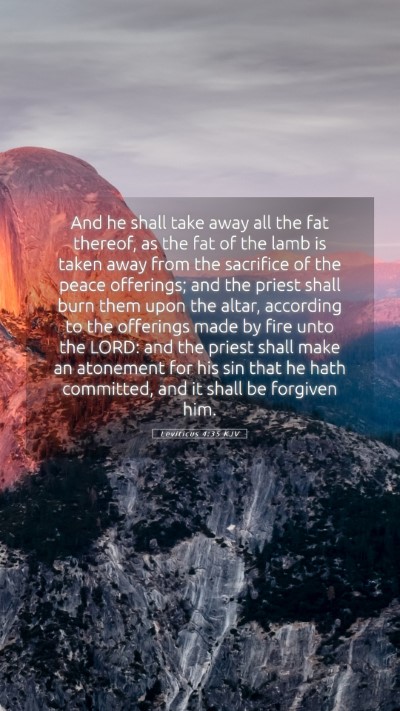Bible Verse Explanation: Leviticus 4:35
Leviticus 4:35 states: "And the priest shall take of the blood of the sin offering, and put it upon the horns of the altar of burnt offering, and shall pour out all the blood at the bottom of the altar." (KJV) This verse is part of the legislation concerning offerings for sin and represents a crucial aspect of the sacrificial system in the Old Testament. Understanding this passage requires an exploration of its context, symbolism, and its implications for sin and atonement.
Context and Significance
The book of Leviticus is essentially a manual for the priests and the people of Israel regarding holiness and worship. When delving into the significance of Leviticus 4:35, it is essential to grasp the cultural and historical context in which these sacrificial rites were practiced.
Commentary Insights
-
Matthew Henry: Matthew Henry emphasizes the seriousness of sin and the necessity of atonement. He comments on the procedure of the sin offering and how the blood symbolizes life, making atonement possible through a substitutionary sacrifice. It highlights God's provision for dealing with sin among His people.
-
Albert Barnes: Barnes elaborates on the ritual action of the priest in the act of sprinkling blood. He notes that this signifies cleansing and consecration, drawing attention to the gravity of sin and the need for an effective means of atonement. The altar, a sacred place, receives the blood as a sign of God’s forgiveness.
-
Adam Clarke: Clarke places emphasis on the necessity of the blood in the covenant relationship between God and Israel. He underscores the importance of the altar, viewing it as a place of divine meeting where sins are addressed. Clarke also discusses the implication of the various sacrifices and how they point toward the ultimate sacrifice of Christ.
Theological Implications
The act of offering a sin offering, as described in Leviticus 4:35, is integral to understanding the theology of sin and forgiveness in the Bible. The sprinkling of blood and its pouring out is a profound illustration of the necessity for reconciling humanity with God. This moment in Scripture foreshadows the ultimate sacrifice of Jesus Christ, whose blood serves as the atonement for sin for all believers.
Application to Daily Life
In modern Christian practice, the themes expressed in this verse encourage believers to recognize the seriousness of sin and the profound grace afforded through atonement. It serves as a reminder that while our sins can separate us from God, the blood of Christ restores and redeems. Reflecting on Leviticus 4:35 allows believers to reassess their relationship with God and appreciate the depths of His mercy.
Cross References
- Hebrews 9:22: "And almost all things are by the law purged with blood; and without shedding of blood is no remission."
- Exodus 30:10: "And Aaron shall make an atonement upon the horns of it once a year with the blood of the sin offering of atonements; once in the year shall he make atonement upon it throughout your generations: it is most holy unto the Lord."
- 1 John 1:7: "But if we walk in the light, as he is in the light, we have fellowship one with another, and the blood of Jesus Christ his Son cleanseth us from all sin."
Conclusion
Leviticus 4:35 serves as a pivotal verse within the legal framework governing the relationship between God and His people concerning sin and atonement. This verse encapsulates the requirements of the Old Testament sacrificial system, foreshadowing the ultimate sacrifice of Jesus Christ. Believers today can derive significant Bible study insights from this passage, understanding the vital nature of confession, repentance, and the preciousness of God's grace.


